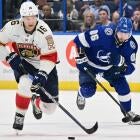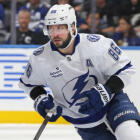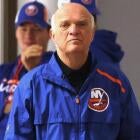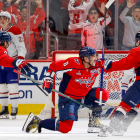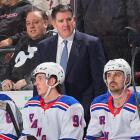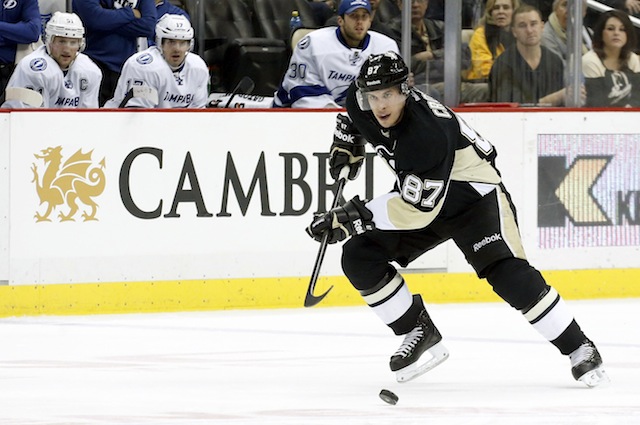
After starting the season with seven goals in his first nine games, Pittsburgh Penguins forward Sidney Crosby has scored just four times in the 29 games since.
On a per-game basis, he is having the worst goal-scoring season of his career and is on a pace that would give him just 25 goals over 82 games. The only time he played more than 50 games and scored fewer than 30 goals was the 2007-08 season, when he scored 24 goals in 53 games. Naturally, this has caused a great deal of concern.
His assist numbers remain among the best in the NHL, and he is still a real threat to go on a tear and claim another scoring title, but the goal totals are not quite what they used to be. This has led to a number of "what's wrong with Sidney Crosby" discussions and a number of theories as to why his goal scoring has dried up.
Among the theories: He's not shooting enough -- or as much as he used to -- something that his current career low of 2.97 shots per game would seem to suggest. But when it comes to his overall shot attempt numbers (which are also down a bit, but not really enough to be a cause for alarm) he is at a similar rate when compared to recent seasons. There is also the idea that following his head injuries a couple of years ago he has not been going to the net as much as he used to, which could not only cut into his goal numbers, but could also result in him missing the net more often when he does shoot.
I'm not sure that is necessarily the case. He is still getting chances (he had two marvelous opportunities in Pittsburgh's game against Boston on Wednesday but failed to score on both, including one attempt that beat Bruins goalie Tuukka Rask only to ring off the post, which has kind of been the way things are going for him lately), and he is still getting his share of shots from down near the net, especially when compared to what he was doing a few years ago (via Sporting Charts) when he was one of the most dangerous goal-scorers in the NHL.
But there might still be one more thing that needs to be considered when trying to figure out why he is not scoring goals the way he used to.
He's not 23 anymore.
Granted, at 27 he's not exactly over the hill, either, but something that doesn't get anywhere near enough attention in hockey is the fact that the top goal scorers in the NHL hit their peak very early in their career. Take the chart below as one one example.

I went back and examined the careers of the top 100 goal scorers in NHL history and looked at when they had their best goal-scoring seasons (I used goals-per-game averages in seasons with a minimum of 30 games played instead of raw goal numbers). The average age was just barely over 25, with the majority of the best seasons coming before a player's age-25 season. There were a couple of random outliers -- mainly from the 1950s and the Original Six era -- with players who ended up having their best seasons in their early-to-mid 30s, but for the most part it was right around, or before, age 25.
Let's take Wayne Gretzky for example. The greatest player in hockey history and the guy who scored more goals than any other player had his three best goal-scoring seasons by his age-24 season. Even though he was still a 200-point player in 1986 (for the fourth time in his career!) at the age of 25, he did so by scoring 40 fewer goals than he did just four years earlier. After his 26th birthday, he scored at a 40-goal pace over 82 games just four times over the final 12 seasons of his career.
To expand on that, let's just hammer this down to the top 10 goal scorers of all time and extend it out to their top-three goal-scoring seasons.
| Top-10 Goal Scorers And Their Three Best Seasons | ||||
| Player | Best season age | Second-best season age | Third-best season age | |
| Wayne Gretzky | 23 | 21 | 24 | |
| Gordie Howe | 24 | 23 | 28 | |
| Brett Hull | 26 | 27 | 25 | |
| Marcel Dionne | 27 | 29 | 31 | |
| Phil Esposito | 28 | 29 | 31 | |
| Jaromir Jagr | 23 | 24 | 22 | |
| Mike Gartner | 25 | 31 | 21 | |
| Mark Messier | 21 | 35 | 22 | |
| Steve Yzerman | 23 | 22 | 24 | |
| Mario Lemieux | 27 | 23 | 30 | |
Eighteen of the 30 seasons on that table happened before a player's 27th birthday, while only one (Phil Esposito) had his best season after 27. Doesn't matter the era, or what team they played for, or who it was, the meaty part of a goal-scorer's career is somewhere between the ages of 22 and 26, and then after that, there is an obvious drop.
That doesn't mean they suddenly cease to be great players. They just do not score the way they used to.
We went through this a couple of years ago when Alex Ovechkin went from scoring 55-60 goals to 40-50. We are going through it now with Sidney Crosby. We will go through it again in a couple of years with Steven Stamkos.
It's not that there is anything necessarily wrong with these guys, and it doesn't mean that they are no longer among the best players in hockey (because they still are). It's just that you might need to adjust your expectations for what they are going to do once they reach a certain point in their career. Once they get past their 25th birthday, you might have already seen their absolute best when it comes to putting the puck in the net.
They will still control games. They will still make their teams and teammates better. And they might even have the occassional season where they go off and put together another 40- or 50-goal performance. It just won't be the norm anymore.
Players like this spoil hockey fans early in their careers with video-game numbers that when they start producing like simply great players instead of something legendary it's viewed as some sort of a disappointment. It shouldn't be. It's just part of the normal career progression of an NHL superstar.
![[object Object] Logo](https://sportshub.cbsistatic.com/i/2020/04/22/e9ceb731-8b3f-4c60-98fe-090ab66a2997/screen-shot-2020-04-22-at-11-04-56-am.png)










